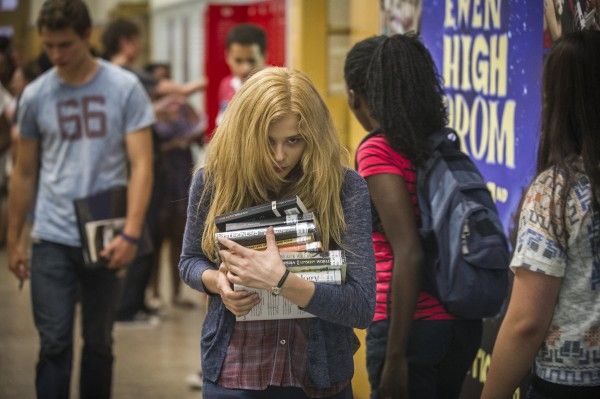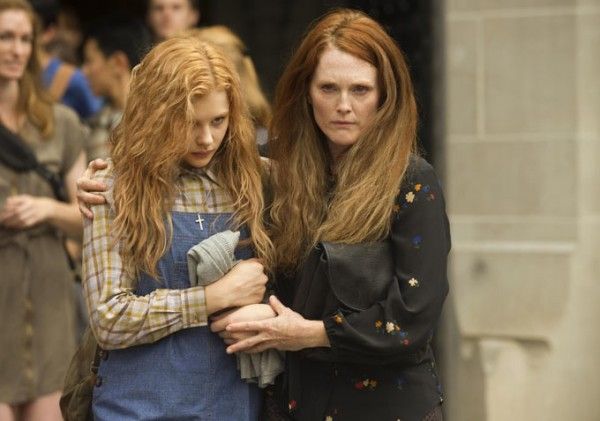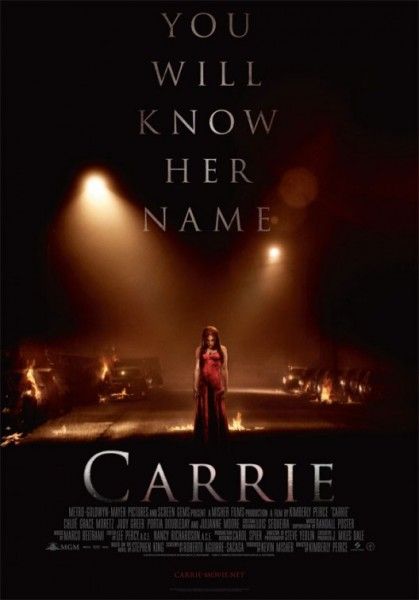Director Kimberley Peirce wants her remake of Carrie to mean something, but she can't seem to figure out what. Brian De Palma's original adaptation of Stephen King's novel is a classic, but Peirce's attempt to distinguish her new movie is as scattershot as it gets. While she does manage to slightly tap into the tragic element of the story, all of the characters and themes are far too underdeveloped to have any meaning. We may know where the Carrie White (played by a miscast Chloe Grace Moretz) is going, but the director is too busy speeding through to truly take stock of the darkness that surrounds the troubled protagonist.
The film opens with a gripping scene of Margaret White (Julianne Moore), an evangelical Christian who didn't know she was pregnant, giving birth to a baby girl. Margaret's first instinct is to kill her daughter with a pair of scissors, but then she decides to spare and raise the child. Cutting forward to Carrie's teenage years, we see a shy, unpopular girl who is so ignorant of her body that she thinks she's dying when she has her period in the shower. The cruelest of her bullies, Chris (Portia Doubleday), records the incident on her cell phone, and uploads it to the Internet. The pretty, popular girl Sue Snell (Gabriella Wilde) and gym teacher Ms. Desjardin (Judy Greer) take pity on Carrie, and show her some kindness. But more than school, Carrie fears her mother. However, Carrie has a secret—she's telekinetic, and nothing boosts confidence like having a superpower.
There's really no reason for someone as pretty and reserved as Carrie to be so bullied. Part of the problem is casting Moretz, who is a great actress, but is simply too pretty. At most, she's the ugliest girl at Supermodel High where she's surrounded by beautiful people. Moretz is constantly trying to act past her appearance by looking diminutive and speaking in a quiet voice, but it's a big stretch to think that no guy would find her attractive. Furthermore, it's difficult to understand why Carrie would be singled out by her classmates. It's possible she could be bullied for no good reason, but it would be far more interesting if she acted awkward rather than just felt awkward. Her classmates call her "weird" and "crazy", but the only thing we're told she's actually done (we never see it) is when Chris points out that Carrie deserves to be bullied because, "Her and her mother are always telling people they're going to hell."
While Maragret is clearly twisted and given over to self-abuse and reclusiveness, none of that has passed on to the gentle Carrie. Moore plays the role well, but Peirce never gives mother or daughter much room to have intimate moments. Carrie quickly becomes fascinated of her newfound telekinesis, and Maragret simply walks around her house being crazy. Their unhealthy relationship is depicted as a given, and any moments of conflict such as Margaret locking Carrie in a closet seem fairly tame, especially when we consider the opening scene.
Margaret's zealotry is one of many aspects that's briefly brought up, but never built upon. The same goes for bullying, motherhood, female relationships, and the symbolism of blood. When Carrie gets locked in her closet, there's a crucifix, and then it starts bleeding from stigmata because of…God? It's not like Carrie is a Christ figture. There's plenty of blood in the movie, but there's barely a hint of the relationship between religion and female sexuality beyond the Bible making women—in this case Carrie and Maragret—feel ashamed about their bodies. But as we see in the locker room scene, so do other women. And then it all gets lost by the time Carrie flies into her infamous rage at the prom.
This is the story's signature scene, and Peirce either wants to revel in it or feels obligated to do so. Either way, all attempts at finding something more meaningful in the story go out the window as the director engages in a special effects blowout designed to make us cheer when we really we should feel pity towards this poor girl who was humiliated at her moment of ultimate happiness. Carrie isn't really a horror film. It's not scary. It's a tragedy, and Peirce would rather have a big action scene than let us feel for a very angry girl who is surprisingly calculated in her rampage.
The 1976 adaptation is untouchable, but Peirce had plenty of places to go. She just seems to have no idea what direction she should take. It's frustrating and confusing that she should waste time on Chris' resentment or Carrie developing her telekinesis, especially when that time could be used for some great character scenes with Margaret. Rather than take a moment that would better illustrate Carrie's personality, the story is reduced to trudging through plot beats, and they're plot beats we already know. Carrie may pretend to be about a variety of themes, but it doesn't care to give them any weight. Instead, the movie spends far more energy on the classic blood dump, and is more concerned with making a splash than making us care about Carrie White.
Rating: D



